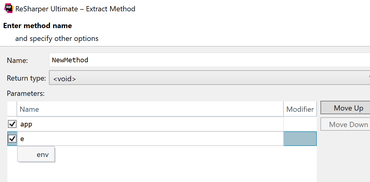Offizieller Lieferant
Als offizieller und autorisierter Distributor beliefern wir Sie mit legitimen Lizenzen direkt von mehr als 200 Softwareherstellern.
Sehen Sie alle unsere Marken.
ReSharper
Initial C# 8 support
Support for Microsoft Visual Studio 2019 RTM
Code formatting update
More files for Go to Text
Optimize References for SDK projects
Improved Extract Method refactoring
Hints in the code editor
ReSharper C++
Performance improvements
Unreal Engine support
C++ language: C++17 and C++20
Navigation
Naming Convention
Formatter
Documentation
Unit testing

Steigern Sie Ihre .NET.-Produktivität!
Live-Chat mit unseren JetBrains-Lizenzierungs-Spezialisten.